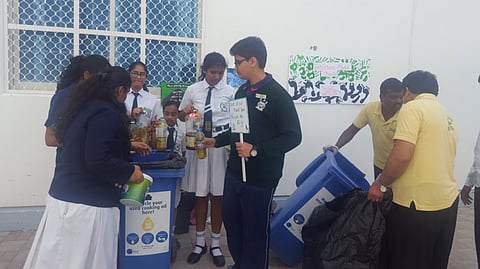One issue, many solutions
Reader raises concern over people pouring cooking oil down the drain

Sharjah
A lot of restaurants and homemakers do not know what to do with used cooking oil and simply pour it down the drain. In October, 2016, our school, Delhi Private School Sharjah, attended a climate change symposium where we were introduced to the damaging effects of dumping cooking oil down the drain. This topic stayed with me for a while and got me worried, as it is a common occurrence, and so, I decided to do some research on it.
The discarded oil can build up inside the pipes and cause backups in the plumbing. This can also go into the street and into the local sewage system. When this happens, it can pose a huge safety and health hazard in one’s environment.
Additionally, it not only clogs the pipes and outlets, but seeps into the ground and aquatic bodies, choking marine life, birds and other organisms, as stated by the US-based Environmental Protection Agency (EPA). It can be toxic and form toxic products, destroy food supplies and habitats. We humans can wash ourselves, but animals find it difficult to get rid of the oil droplets on their feathers and may even suffocate to death.
The Environment Council members of the school decided to apply what we had learnt. Our motto is to not rest on laurels, but take the best and spread the message to the masses. So, we started an initiative to collect used cooking oil in collaboration with Dubai-based waste management company, Blue.
We received a briefing session from the company’s coordinator, Mathilde Allard-Khalifa, on how to involve students and teachers. Emphasis was placed on how cooking oil, which is used every day for frying and other cooking purposes, should not be used more than three times, as it may adversely affect the health of the consumer, and should instead be recycled.
Cooking oil provides a source of alternative energy. When used cooking oil is refined, it can be converted into diesel fuel that can be used for heating buildings. The converted product is not harmful to the environment as it does not contain any hazardous chemicals.
By changing the used oil’s chemical properties, it can be converted into a product that behaves like petroleum-based fuel. When we use biofuels, we are helping stop greenhouse gas emissions and preventing waste accumulation. This approach also helps reduce the problem of choked drainage systems.
Recycling bins were placed in designated areas around the school. I felt proud to notice how students, teachers and parents did their bit for the environment. We collected around 85 litres of used cooking oil in six months.
When we shared our campaign idea with the parents, Anoop Menon, father of a pupil at our school, said: “Recycling oil is a great way to protect our precious environment and make it healthier. By recycling oil from the restaurant and at a domestic level, we can add to our fuel resources.”
The waste management company collects the used cooking oil every month and provides us detailed information about the total quantity collected, which keeps us updated on our progress. Ours is the first school in Sharjah to have taken up this initiative. But, we hope that many other schools join in soon, and the awareness spreads at a neighbourhood level, too.
The school’s principal, Vandana Marwaha, said: “We hope to take up many more such initiatives to help fight climate change and protect the environment in the future.”
— The reader is a teacher at Delhi Private School in Sharjah.
Be a community reporter. Send us your videos and pictures at readers@gulfnews.com



